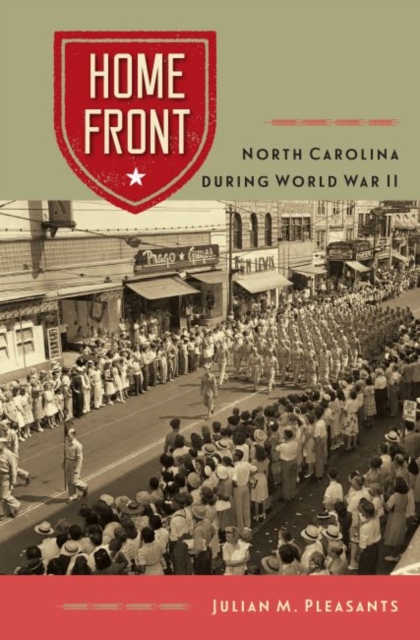Home Front: North Carolina During World War II

Home Front: North Carolina During World War II
At the outset of World War II, North Carolina was one of the poorest states in the Union. More than half of the land was rural. Over one-third of the farms had no electricity; only one in eight had a telephone. Illiteracy and a lack of education resulted in the highest rate of draft rejections of any state. The citizens desperately wanted higher living standards, and the war would soon awaken the Rip Van Winkle state to its fullest potential. Home Front traces the evolution of the people, customs, traditions, and attitudes, arguing that World War II was the most significant event in the history of modern North Carolina. Using oral history interviews, newspaper accounts, and other primary sources, historian Julian Pleasants explores the triumphs, hardships, and emotions of North Carolinians during this critical period. The Training and Selective Service Act of 1940 created over fifty new military bases in the state to train two million troops. Citizens witnessed German submarines sinking merchant vessels off the coast, struggled to understand and cope with rationing regulations, and used 10,000 German POWs as farm and factory laborers. The massive influx of newcomers reinvigorated markets--the timber, mineral, textile, tobacco, and shipbuilding industries boomed, and farmers and other manufacturing firms achieved economic success. Although racial and gender discrimination remained, World War II provided social and economic opportunities for black North Carolinians and for women to fill jobs once limited to men, helping to pave the way for the civil and women's rights movements that followed. The conclusion of World War II found North Carolina drastically different. Families had lost sons and daughters, fathers and mothers, and brothers and sisters. Despite all the sacrifices and dislocations, the once provincial state looked forward to a modern, diversified, and highly industrialized future.
PRP: 179.49 Lei
Acesta este Prețul Recomandat de Producător. Prețul de vânzare al produsului este afișat mai jos.
161.54Lei
161.54Lei
179.49 LeiLivrare in 2-4 saptamani
Descrierea produsului
At the outset of World War II, North Carolina was one of the poorest states in the Union. More than half of the land was rural. Over one-third of the farms had no electricity; only one in eight had a telephone. Illiteracy and a lack of education resulted in the highest rate of draft rejections of any state. The citizens desperately wanted higher living standards, and the war would soon awaken the Rip Van Winkle state to its fullest potential. Home Front traces the evolution of the people, customs, traditions, and attitudes, arguing that World War II was the most significant event in the history of modern North Carolina. Using oral history interviews, newspaper accounts, and other primary sources, historian Julian Pleasants explores the triumphs, hardships, and emotions of North Carolinians during this critical period. The Training and Selective Service Act of 1940 created over fifty new military bases in the state to train two million troops. Citizens witnessed German submarines sinking merchant vessels off the coast, struggled to understand and cope with rationing regulations, and used 10,000 German POWs as farm and factory laborers. The massive influx of newcomers reinvigorated markets--the timber, mineral, textile, tobacco, and shipbuilding industries boomed, and farmers and other manufacturing firms achieved economic success. Although racial and gender discrimination remained, World War II provided social and economic opportunities for black North Carolinians and for women to fill jobs once limited to men, helping to pave the way for the civil and women's rights movements that followed. The conclusion of World War II found North Carolina drastically different. Families had lost sons and daughters, fathers and mothers, and brothers and sisters. Despite all the sacrifices and dislocations, the once provincial state looked forward to a modern, diversified, and highly industrialized future.









